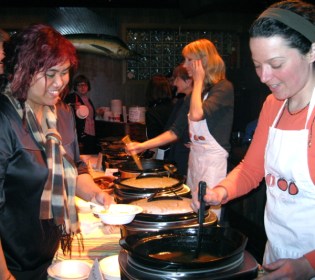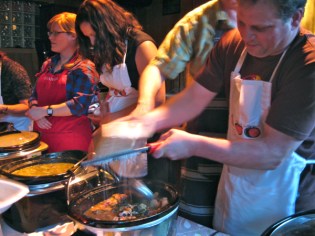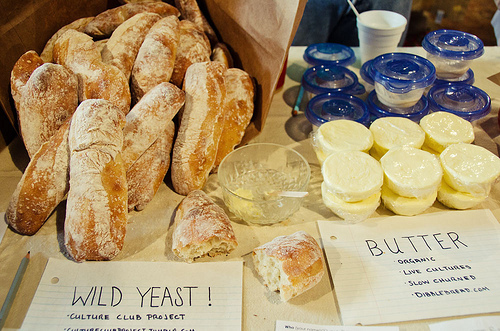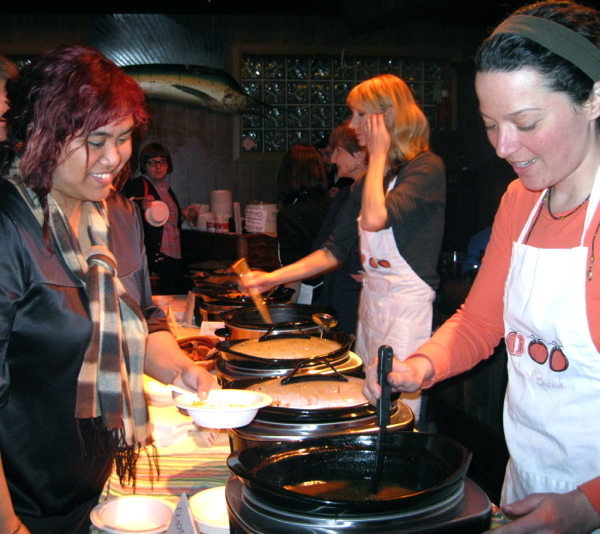
Soup & Bread is a way to bring community together in the dead of winter, and raise money for those who don't have access to healthy food.
Who doesn’t love soup? It’s nutritious, inexpensive, and there are so many kinds! Soup can be an earthy meal in a chipped pottery bowl or an elegant palate cleanser frothed into a porcelain cup. It can showcase the explosive flavor of fresh spring peas or provide refuge for tired celery and stale bread. Soup soothes the sick, it nourishes the poor — and it tricks children into eating their veggies. And perhaps more than any other food, soup can be a powerful tool for building community.
I learned all this and more when I launched Soup & Bread, a free weekly gathering in Chicago, during the bleak winter of 2009. Back then I was broke, bored, and bartending at a music club called the Hideout. The recession was hitting hard; my friends and neighbors were losing their jobs. At times, when I looked around, it seemed the whole city could use a nice bowl of soup. So I thrifted a bunch of Crock-Pots and invited a handful of people to come by the bar to eat.
Now, every Wednesday in winter, chefs, musicians, artists, food activists, farmers, and others bring pots of soup to the Hideout for 100 people at a time. A local bakery donates bread and we encourage pay-what-you-can donations, which are directed to a different hunger relief organization every week. It’s an easy, low-key way to get people out of the house and socializing in the dead of winter. And as word has spread — and as I’ve gone on to help stage Soup & Bread events in Madison, Wis., Seattle, Brooklyn, and beyond — Soup & Bread has raised more than $20,000 for a wide range of food pantries, soup kitchens, and other groups, usually in small sums of $300-$400.
 Everybody wins: Hungry attendees get food, volunteer cooks get glory, the bar gets business, and the food pantries get funds. Los Angeles-based writer and “urban homesteader” Erik Knutzen described Soup & Bread as “permaculture: a self-sustaining, mutually beneficial system.”
Everybody wins: Hungry attendees get food, volunteer cooks get glory, the bar gets business, and the food pantries get funds. Los Angeles-based writer and “urban homesteader” Erik Knutzen described Soup & Bread as “permaculture: a self-sustaining, mutually beneficial system.”
As I got out in the world and started talking to people about soup, something weird happened. It was like I had stumbled onto a radio station I’d never heard before. There’s a lot of static out there in the food world — but once you tune into the soup signal, it comes through loud and clear.
I heard stories about cultural soup folkways — the Muslim tradition of breaking the Ramadan fast with a bowl of harrira, for instance. I heard about soup salons and family soup Sundays. I found out about neighborhood soup swaps and international anti-hunger efforts like Empty Bowls. The Chicago-based arts group InCubate pioneered the use of soup as a microfunding tool; the social activists of Food Not Bombs serve soup in public parks as a protest against war and economic injustice.
These soup traditions, old and new, are as forgiving and flexible as soup itself. But they share a hospitality that’s extended to all comers — over the table, across the years. They’re a little subversive, gently radical, upending expectations about the role of food in the world.
The recipes that follow might give you a taste for all that soup can do. They’ve been excerpted from Soup & Bread Cookbook: Building Community One Pot at a Time.
Roasted Root Vegetable Soup
From Grace Tran
Serves 12
When Grace said she was bringing a soup built on roasted root vegetables to Soup & Bread, I was expecting heavy-duty winter starches like sweet potatoes and turnips. Instead, this soup is chock-full of light and sprightly parsnips and celery root, mixed with earthy nutmeg and the surprise of spinach. Roasting the roots first brings out the sugar and helps build fantastic flavor in the pot.
Ingredients:
2 tablespoons extra virgin olive oil
1 large onion, thinly sliced
2 leeks, white and pale green parts, thinly sliced
2 garlic cloves, minced
1 cup pearled barley
8 cups low-sodium vegetable broth
4 cups water
10 thyme sprigs
2 bay leaves
1/2 pound celery root, peeled and cut into 1/2-inch cubes
1 pound parsnips, peeled and cut into 1/2-inch pieces
salt and freshly ground pepper
1 pound baby spinach
1 teaspoon freshly grated nutmeg
Preparation:
Preheat oven to 400 degrees. Toss celery root and parsnips with olive oil. Roast for 35-45 minutes, until caramelized. Stir occasionally.
In a large pot, heat the oil. Add onion, leeks, and garlic and cook over moderate heat, stirring occasionally, until tender, about 5 minutes. Stir in barley. Add vegetable broth, water, thyme, and bay leaves, and bring to a boil. Add celery root and parsnips and season with salt and pepper. Simmer over moderately low heat until barley and root vegetables are tender, about 40 minutes to an hour.
Stir in the spinach and nutmeg and simmer for 5-7 minutes. Season with salt and pepper and serve in deep bowls, along with hearty whole-grain bread.
Grace Tran works with a counseling program at the nonprofit Alternative Schools Network and is an organizer of the Chicago Youth Community Film Festival for high school students. In her spare time, she watercolors, draws comics, and enjoys fine films.
Inspiration Kitchen’s Sweet Potato Soup
From David Rosenthall
Serves 12
Ingredients:
2 pounds sweet potatoes, peeled and cut into 1/2-inch pieces
4 tablespoons butter
1/2 tablespoon light brown sugar
1/2 tablespoon fresh grated ginger
1 leek (white and pale green parts), thinly sliced
2 ribs celery, chopped into 1/2-inch pieces
6 cups vegetable stock
3/4 cup orange juice
1 cup heavy cream
1 tablespoon salt
1/2 teaspoon white pepper
Preparation:
Melt butter in large pot over medium heat, then add sweet potatoes and sugar and toss to coat. Add leeks, celery, salt, and pepper and sauté for 15-20 minutes. Add stock, juice, and cream and bring mixture to boil. Reduce heat and simmer until ingredients are very tender, 30-45 minutes.
Puree soup and, if necessary, return soup to pot. Thin with more broth, if desired. Season with salt and pepper.
Serve garnished with cumin crema and toasted pepitas.
Cumin crema
1 cup sour cream
2 tablespoons cream cheese
1 teaspoon ground cumin
1 tablespoon lime juice
1 tablespoon cilantro (chopped)
1/2 teaspoon salt
1/4 teaspoon white pepper
Preparation:
Combine all ingredients in food processor and pulse until thoroughly incorporated.
Toasted pepitas
1 cup raw pepitas (pumpkin seeds)
1 teaspoon salt
1/2 teaspoon pepper
1/4 teaspoon ancho chili powder
1 tablespoon olive oil
Preparation:
Combine ingredients in bowl and toss to coat. Spread seeds out on a parchment-lined sheet tray and toast in 350-degree oven, turning occasionally, until lightly browned, approximately 15–20 minutes.
David Rosenthall is executive chef at Inspiration Kitchens-Garfield Park, a food-service training program that helps Chicagoans affected by homelessness or poverty learn culinary skills and pursue a career in the hospitality industry.
White Bean, Kale, Kielbasa, and Tortellini Soup
From Anastasia Davies Hinchsliff
Serves eight
Anastasia, a Hideout bartender and an all-around crafty lady, was one of our very first Soup & Bread cooks. She brought this beans-and-greens concoction (adapted from an Epicurious recipe) for our inaugural soup night in 2009, and brought her two young sons for family dinner almost every Wednesday for three years running.
Ingredients:
1 pound dried white beans such as Great Northern, cannellini, or navy
2 onions, coarsely chopped
2 tablespoons olive oil
4 garlic cloves, finely chopped
5 cups chicken broth
8 cups water
1 (3 inch x 2 inch) piece of Parmesan rind
2 teaspoons salt
1 bay leaf
1 teaspoon finely chopped fresh rosemary
1 pound smoked kielbasa (fully cooked), sliced crosswise into 1/4-inch pieces
8 carrots, halved lengthwise and cut into 1/2-inch pieces
1 pound kale, stems and center ribs discarded, leaves coarsely chopped
1/2-1 pound cheese tortellini (fresh or boxed)
salt and pepper
Preparation:
Cover beans under 2 inches of water in a pot and bring to a boil. Remove from heat and let stand, uncovered, 1 hour. Drain beans and rinse. Set aside.
Cook onions in oil in an 8-quart pot over moderately low heat, stirring occasionally, until softened, 4 to 5 minutes. Add garlic and cook, stirring frequently, for 1 minute. Add beans, broth, 1 quart of water, cheese rind, salt, pepper, bay leaf, and rosemary and simmer, uncovered, until beans are just tender, about 50 minutes.
Stir carrots into soup and simmer 5 minutes. Stir in kale, sausage, tortellini, and remaining quart of water and simmer, uncovered, stirring occasionally, until kale is tender and pasta is cooked. Season with salt and pepper to taste.
Anastasia Davies Hinchsliff is a mother, gardener, bread maker, and soup eater. She lives in Chicago.
Cedar Valley Sustainable Farm Beef and Pork Chili
From Beth and Jody Osmund
Serves 12
Beth and Jody have been valiant Soup & Bread supporters, driving in every winter from their farm in Ottawa, Ill., to serve up an annual soup. This phenomenally hearty chili showcases their sustainably raised beef and pork.
Ingredients:
1/2 cup vegetable oil
1 pound ground beef
1 pound ground pork
2 large onions, chopped
6 cloves garlic, sliced (or 4 teaspoons minced garlic)
2 tablespoons chili powder
1 tablespoon cayenne pepper
1 tablespoon ground black pepper
1 tablespoon kosher salt
1 tablespoon fresh lime juice
2 12-ounce bottles dark beer
1 24-ounce can tomato sauce
3 14-ounce cans diced tomatoes
24 fluid ounces tomato juice
3 14-ounce cans chili beans
1-2 large, dried ancho peppers
Preparation:
Heat oil in a large stockpot over medium heat. Crumble the beef and pork into the pot, and cook, stirring frequently, until the meat is no longer pink. Add onion, garlic, and spices and cook until onions soften.
Add the lime juice and beer. Stir in the tomatoes, tomato sauce, tomato juice, and beans. Drop in dried peppers and simmer for several hours. Taste periodically and add spice as desired. (Jody sometimes adds a tablespoon of cocoa power for a richer, smoky taste.)
Serve with bowls of chopped scallions, sour cream, cilantro, and grated cheddar cheese as add-ins.
Cedar Valley Sustainable Farm (CVSF) is run by Jody and Beth Osmund and is home to Illinois’ first community-supported meat sharing subscription. Along with their own offspring the Osmunds raise beef, chicken, pork, and eggs along the banks of Indian Creek in rural Ottawa. At CVSF it’s all about the food: raising it, cooking it, and eating it!





